Eleider Alvarez sprung one of the boxing upsets of the year on Saturday night with a stunning seventh round stoppage of Sergey Kovalev in Atlantic City.
Ironically, the bout took place at the same venue where the Russian ‘Krusher’ scored his signature career win in 2014; a shutout of the legendary Bernard Hopkins which saw him unify three title belts and gain plaudits as the best light heavyweight on the planet.
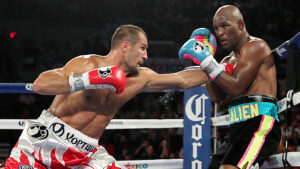
It now all seems a lifetime ago.
With one howitzer right hand, Alvarez, not hitherto known for his punching prowess, wrested the WBO World light heavyweight title from Kovalev’s clutches and, in all likelihood, finished him as a fighter at the elite level. To add insult to injury, Kovalev was ahead on all three judges’ scorecards and in control up until getting caught.
The outcome represents quite simply a massive reversal of fortunes. If Alvarez’s predicament post sixth-round, with the fight slipping away from him, was preying on his mind, it surely pales in comparison with the trials and tribulations he had to undergo to fight for a World title in the first place.
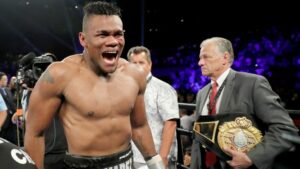
Originally from Colombia but now based in Canada, Alvarez was WBC champion Adonis Stevenson’s mandatory challenger for over two years, but never stepped foot in the ring with the Haitian knockout artist – even though both share the same promoter in Yvon Michel.
Step-aside agreements left Stevenson free to make voluntary defences against overmatched opponents Thomas Williams Jr. and Andrzej Fonfara, who were both blown away in short order, while Alvarez faced former titleholders Lucian Bute and Jean Pascal in title eliminators; both faded veterans who still commanded big name value in Canada.
Alvarez defeated both handily but looked more solid than sensational, a trend going back to his 2015 fight against tough-but-basic Isidro Ranoni Prieto, in which he was hurt by his unheralded foe on several occasions and flattered by far-too-wide scorecards. He scraped past Isaac Chilemba via majority decision to gain WBC mandatory status and then failed to put away journeymen Robert Berridge and Norbert Dabrowski, settling instead for wide points decisions.
What it all amounted to on paper was hardly a proposition to strike fear into the heart of the ‘Krusher’, who had rebuilt after two successive defeats to Andre Ward with a two-round stomping of Vyacheslav Shabranskyy (recapturing the WBO title left vacant by Ward’s retirement) followed by stopping Igor Mikhalkin on cuts in the seventh. Alvarez was a step-up from these names and a solid test, but no more than that in the eyes of most analysts – and so it seemed for six rounds on Saturday night.
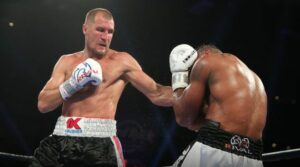
We were watching a more athletic Kovalev than seen of late, moving and boxing well. He was landing more shots and the harder ones. Alvarez was rattled on more than one occasion, but maintained his composure under fire and kept looking for opportunities to counter. Still, he was clearly behind going into the decisive seventh round and also bleeding from under his left eye due to an accidental headbutt.
The cut seemed to flip a switch in Alvarez – not normally known for fighting with energy or passion – as he opted to come out aggressively and trade with Kovalev. Then it came. On the 1:20 mark, Alvarez threw a tried-and-tested combination consisting of a left jab to the body followed by an overhand right to the head which he had christened ‘The McIntosh’, after the British boxer who fell victim to it back in 2012 when Alvarez was still an up-and-coming prospect. The right hand caught Kovalev flush on the side of the head, causing him to wobble and fall backwards onto the canvas. Kovalev got up quickly, too quickly, and was clearly in bad shape. Alvarez went in for the kill and caught Kovalev again with a left hook that sent him down for the second knockdown. Once again, the champion rose quickly but was still on ‘Queer Street’ and his third visit to the canvas shortly after was merely a formality as referee David Fields waved off the contest.
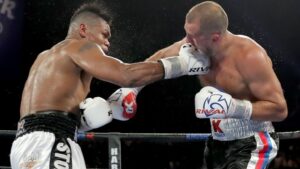
Alvarez’s right hand not only put paid to Kovalev’s future at the top of the sport, but also killed the possibility of an eagerly-anticipated and expected future unification fight between the deposed champion and his countryman, WBA World light heavyweight titlist Dmitry Bivol.
Bivol, who successfully defended his title on the undercard against former Alvarez and Kovalev victim Isaac Chilemba – who barely deserved the shot on the back of three losses in his previous four fights – is, at twenty-seven-years-of-age, the youngest of the current light heavyweight champions.

Currently on a significant tear, having stopped his last five opponents in impressive fashion (most notably tough Cuban contender Sullivan Barrera in his last fight), Bivol looked decidedly less scintillating against Chilema, a notoriously awkward customer. Despite arguably winning every round, just as one judge had it at the fight’s conclusion, Bivol never came close to becoming the first man to take out the teak-tough Malawian (injury accounted for the Chilemba’s only stoppage loss to date, against Oleksandr Gvozdyk) in a dull, dreary affair.
Thanks to the weekend events, we are now presented with a different potential unification fight at light heavyweight, namely Alvarez versus Bivol.
Considering the nature of their respective victories, it’s a far more intriguing match-up than would have been the case prior-to.
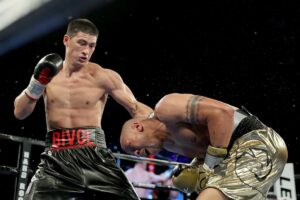
That being said, if Saturday night taught us anything, it’s that one can never make any assumptions in boxing, contrary to the inevitable spewing on social media; Kovalev was a shot fighter post-Ward; Alvarez was the goods all along and just needed the right opponent to motivate him; Bivol is an overrated hype-job, blah, blah, blah. Rather it is a sport in which fortunes can change in the blink of an eye thanks to circumstances beyond our power and control.
Just ponder the image of Sergey Kovalev, once heralded as the most feared man in boxing, with his body sprawled on the canvas and his mind in orbit courtesy of Alvarez’s right hand – but perhaps also asking itself somewhere on the outer extremities of the galaxy ‘what the hell went wrong?’.
To quote the poet Robert Burns whose words were later immortalised by John Steinbeck in the title of his novel borrowed from the text:
‘The best laid schemes of mice and men / Often go awry’
Article by: Paul Lam
Follow Paul on Twitter at: @PaulTheWallLam